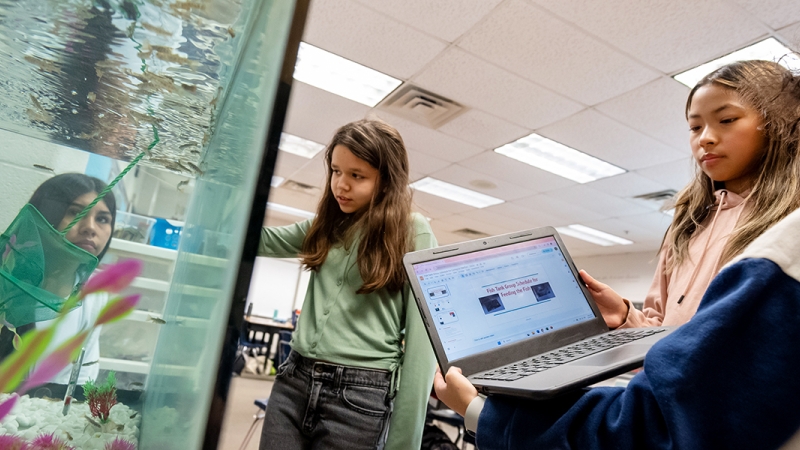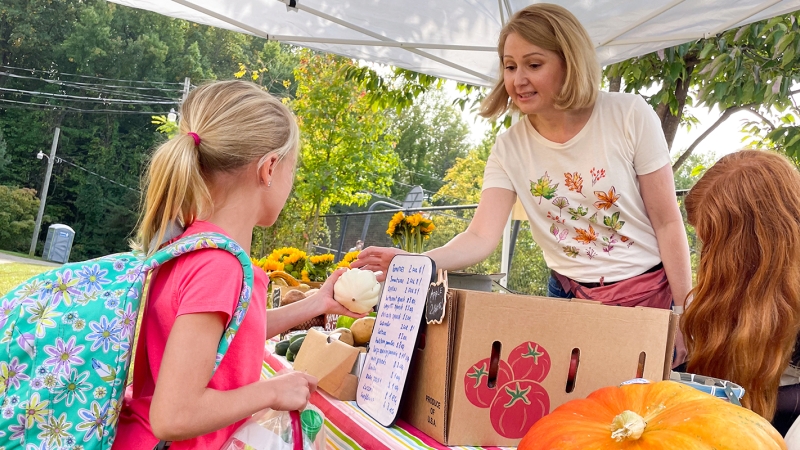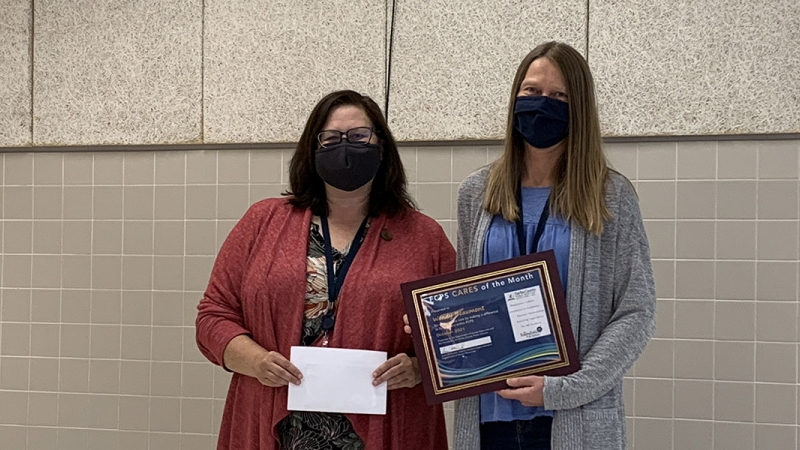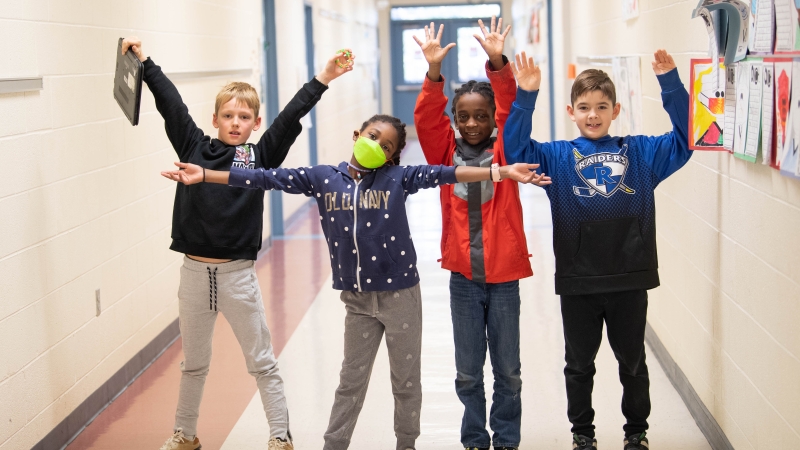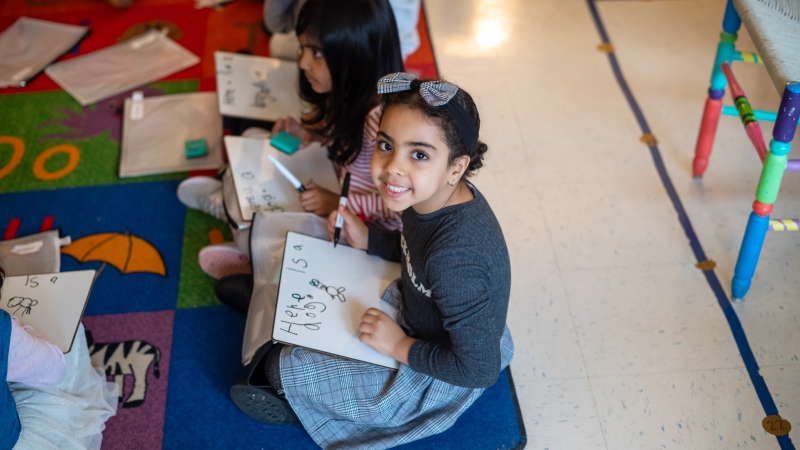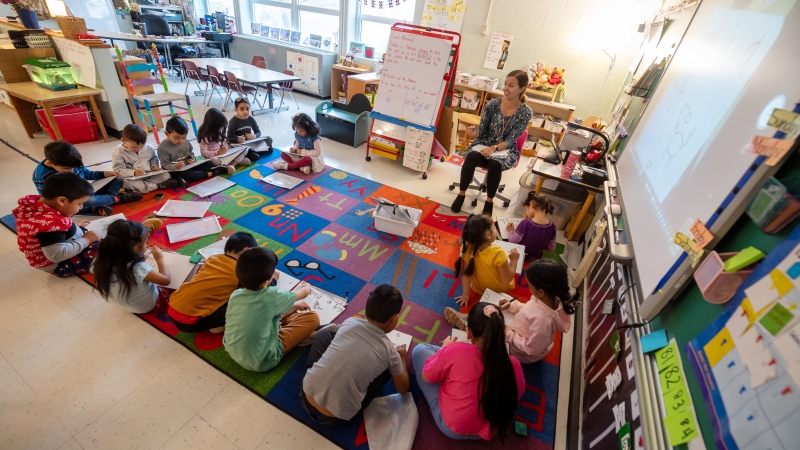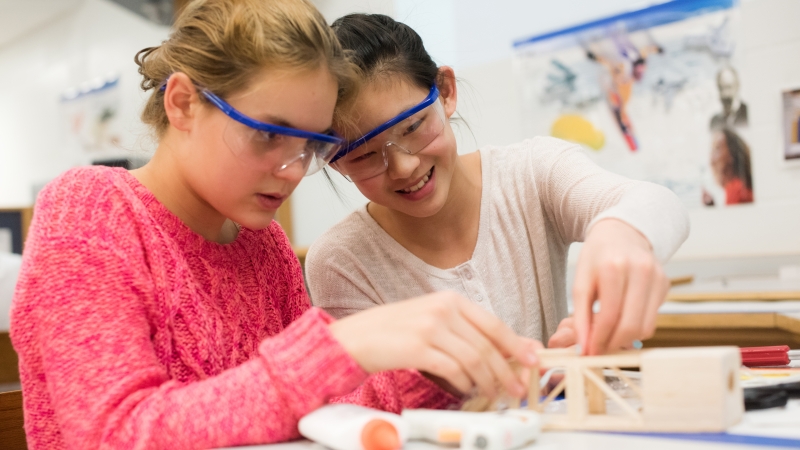
Hard Work Pays Off: Centreville Elementary School Releases Classroom-Raised Trout
It’s a sunny Tuesday morning in the Shenandoah Valley. A charter bus rolls into the Elizabeth Furnace Recreation Area and drops off dozens of students from Centreville Elementary School. They’re greeted by MaryAnn Settlemyre, the school’s STEAM (science, technology, engineering, art, and math) lead. Today is the day the students have been preparing for since the start of the school year. Over the coming hours, each student will release the young trout they raised into a freshwater stream.
 042422-1165.jpg" data-align="left" data-entity-uuid="52b86d43-9e32-4c83-ba47-754834c466a3" data-entity-type="file" alt="Centreville Elementary STEAM lead, MaryAnn Settlemyre, instructs students on how to release trout. She holds a cup with a single fry. Students need to hold the cup in the stream for a couple of minutes to help acclimate the young trout to the water. " width="5549" height="3699" data-caption="Centreville Elementary STEAM lead, MaryAnn Settlemyre, instructs students on how to release trout. She holds a cup with a single fry. Students need to hold the cup in the stream for a couple of minutes to help acclimate the young trout to the water. ">
042422-1165.jpg" data-align="left" data-entity-uuid="52b86d43-9e32-4c83-ba47-754834c466a3" data-entity-type="file" alt="Centreville Elementary STEAM lead, MaryAnn Settlemyre, instructs students on how to release trout. She holds a cup with a single fry. Students need to hold the cup in the stream for a couple of minutes to help acclimate the young trout to the water. " width="5549" height="3699" data-caption="Centreville Elementary STEAM lead, MaryAnn Settlemyre, instructs students on how to release trout. She holds a cup with a single fry. Students need to hold the cup in the stream for a couple of minutes to help acclimate the young trout to the water. ">Settlemyre gathers the students in a picnic area near the release site to explain the many outdoor activities the students will enjoy, and ends with a warning: “You’re going to get wet; you’re going to get dirty.” Upon hearing this, some students sport wide grins and jump with glee. Minutes later, groups of students take off their shoes and socks, roll up their pant legs, and step into the cool flowing water.
This is the final phase of Trout in the Classroom, one of many programs at Centreville Elementary that help students in suburban Fairfax County get in touch with nature. Trout in the Classroom, taught in collaboration with the Virginia Council of Trout Unlimited and the Virginia Department of Wildlife Resources, teaches students the importance of conservation. It starts with fish tanks in the classroom, where students raise varieties of trout from egg to fry (a young trout, less than one inch long, that has learned to search for food). Then, students release the fry into a local stream, learning the importance of wildlife conservation.
Indeed, Centreville Elementary students learned surprising things about trout. Reflecting on the experience, sixth grader Isabela Sofia Rodriguez-Gomez says she was impressed with “how high they can jump because some of them jumped out of the tank!”
 042422-1178.jpg" data-align="right" data-entity-uuid="71f7b109-c8ca-4fdc-8401-7ee2f6d92a9b" data-entity-type="file" alt="A close up of the clear biodegradable plastic cup holding a fry. The young fish, only a couple of inches long, swims toward the cup's edge." width="6192" height="4128" data-caption="A close-up of the clear biodegradable plastic cup holding a fry. The young fish, only a couple of inches long, swims toward the cup's edge.">
042422-1178.jpg" data-align="right" data-entity-uuid="71f7b109-c8ca-4fdc-8401-7ee2f6d92a9b" data-entity-type="file" alt="A close up of the clear biodegradable plastic cup holding a fry. The young fish, only a couple of inches long, swims toward the cup's edge." width="6192" height="4128" data-caption="A close-up of the clear biodegradable plastic cup holding a fry. The young fish, only a couple of inches long, swims toward the cup's edge.">Life on the “Trout Team"
Isabela is one of several students on Centreville Elementary’s Trout Team. Since the beginning of the school year, these students were responsible for cleaning the fish tanks, regularly checking the temperature and pH levels of the water, and of course, feeding and caring for the trout.
The hard work she put in was worth it. Isabela says it felt exciting “seeing them swim off.” She says it has inspired her to continue working on environmental projects when she moves up to middle school in the new school year.
Another Trout Team member, sixth grader Alexandra Schander, says getting into the stream felt “kind of cold at first,” but “releasing them and letting them free” was the best part. She also learned a lot about raising the trout, especially “seeing how they grow up. They got bigger!” she exclaimed.
 042422-1194.jpg" data-align="left" data-entity-uuid="786b9f82-6e93-4e62-85da-b49662782f1c" data-entity-type="file" alt="A student smiles as she holds a cup containing a fry in the ankle-deep waters of the stream." width="6192" height="4128" data-caption="Each student took a turn releasing a trout into the cool stream waters in the Elizabeth Furnace Recreation Area.">
042422-1194.jpg" data-align="left" data-entity-uuid="786b9f82-6e93-4e62-85da-b49662782f1c" data-entity-type="file" alt="A student smiles as she holds a cup containing a fry in the ankle-deep waters of the stream." width="6192" height="4128" data-caption="Each student took a turn releasing a trout into the cool stream waters in the Elizabeth Furnace Recreation Area.">Fifth Grade Teacher Danielle Kaufman is a first-year teacher at Centreville Elementary. She felt impressed seeing how well the students from suburbia handled a day out in nature — mud, bugs, and all.
“There weren’t as many grossed-out gasps as I would have anticipated hearing,” she said. “It was a lot of, ‘Oh my gosh, this is so cool.’ It helps bring a smile to my face, and makes me want to get out of my comfort zone.”
Settlemyre says outdoor, hands-on lessons like this help students better conceptualize what they’re learning in the classroom.
“I think the students understand what we mean by ‘environment,’” she explains. “I think they understand after spending time in the woods and seeing the fish. Now when I say, ‘OK, we have to work towards saving this environment,’ they know what the environment is. So they walk away with a sense of understanding of something that's always been abstract.”
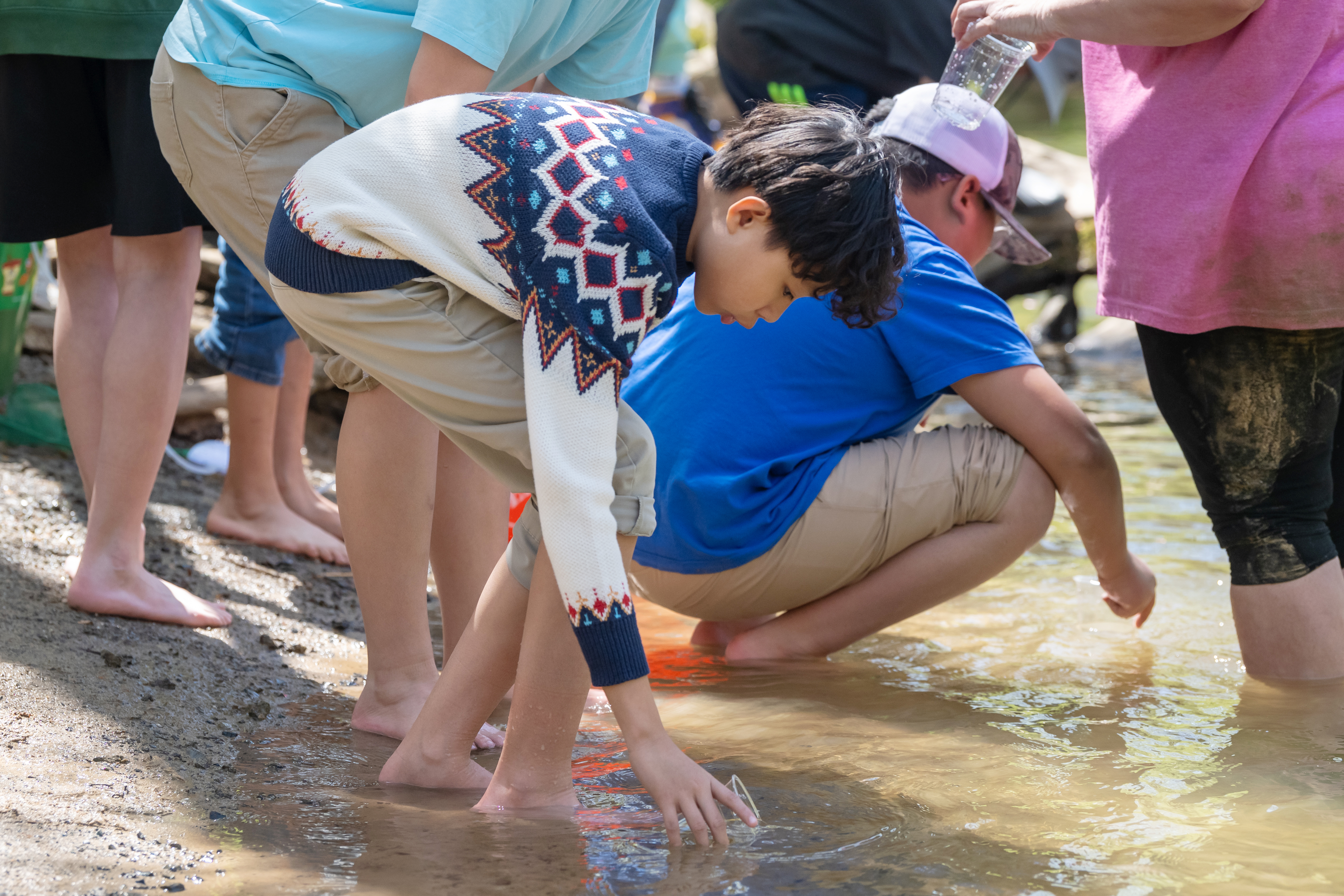
George Paine, Trout in the Classroom coordinator for Trout Unlimited’s Northern Virginia Chapter, agrees that the program is a great way to help students understand the responsibility of caring for nature. “The brook trout used to live in Northern Virginia, but they were wiped out,” he explained. “There’s a problem with siltation, other forms of pollution, too much fertilizer in people’s yards — all kinds of human factors.”
Connecting with Nature
The Elizabeth Furnace field day offers students more than the chance to release their trout — although that is the highlight. Set up across the picnic area are activity stations where students can find other ways to connect with nature. Volunteers from Centreville High School’s 4-H Club staffed stations teaching students how to identify wildflowers, test water quality, and understand how grubs, insects, and larger animals play a role in the ecosystem. Another student volunteer demonstrated fly fishing — a reminder that humans, too, are part of the food chain.
“The students were solely responsible for planning and organizing their stations,” said Centreville High School Biology Teacher Heather Fehr. “This year, the students went further. For example, at the flower identification station, the girls brought twine so the elementary students could take a bouquet home with them. The water quality site added in trivia. The elementary students had a blast with them.”
Fehr and her family also worked on the activities - she brought her daughter, a former Centreville Elementary student, to volunteer.
“I was incredibly proud of both the high school students and the elementary students,” Fehr said. “The high school students conducted themselves maturely and tried to gauge the students’ interests. It was an amazing experience for all involved.”
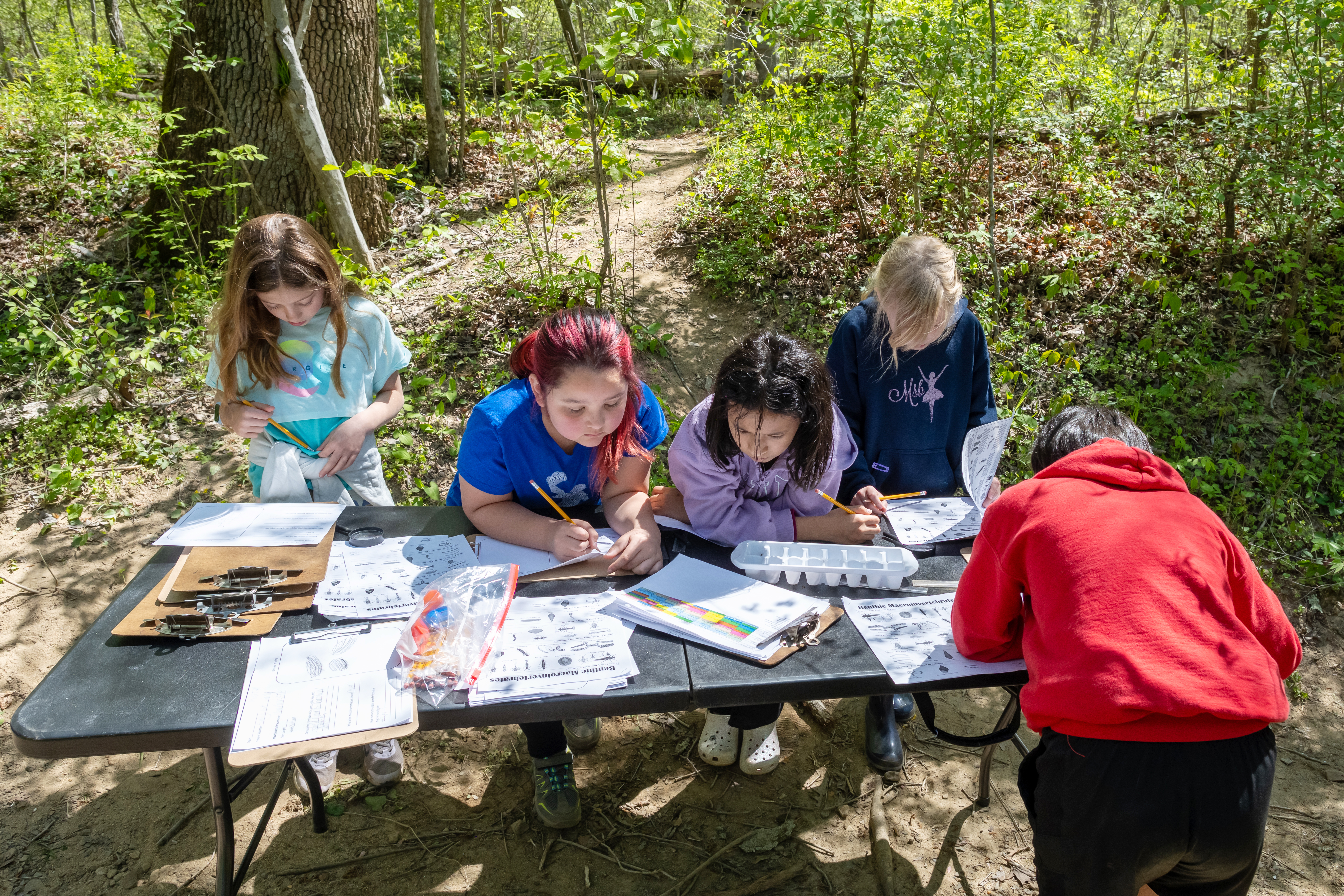
It is Easy Being Green
Trout in the Classroom is one of many projects spearheaded by Centreville Elementary School’s student/teacher Green Team, which empowers students to apply FCPS’ Portrait of a Graduate goals to make positive change in our world.
Centreville’s Green Team members are “100% the leaders,” Principal Josh Douds explained. “They are activists, concerned and passionate about supporting our environment. They set up meetings with me to advocate that we buy things for the school, we're changing things on our property to make sure we're successful in supporting them.”
 042422-1006.jpg" data-align="right" data-entity-uuid="0869efd2-f31c-4f9c-a385-fe94404f368a" data-entity-type="file" alt="A student holds up a cup containing a fry. The fish, about two inches long, swims toward the bottom of the cup." width="6192" height="4128" data-caption="From classroom to cup to stream, Centreville Elementary School students complete another school year raising trout.">
042422-1006.jpg" data-align="right" data-entity-uuid="0869efd2-f31c-4f9c-a385-fe94404f368a" data-entity-type="file" alt="A student holds up a cup containing a fry. The fish, about two inches long, swims toward the bottom of the cup." width="6192" height="4128" data-caption="From classroom to cup to stream, Centreville Elementary School students complete another school year raising trout.">Douds thinks events like this create a “culture of environmentally friendly students,” and the small impact they leave on the environment can inspire all of us to do something even more impactful.
“That one small step is a change towards everyone working together to make one large step and one big change to make our Earth a better place,” he explained.
Centreville fourth grader Emma Caggianelli is very involved with her school’s green initiatives. She volunteers at the school’s weekly farmers market and joined the rest of the Green Team at the trout release.
“I think it’s really special that Centreville gets to come out here and release the trout that we’ve grown for the whole year,” she said. “It was very cool to watch the trout stay in one area for a little bit and then watch them swim away.”
After hours of fun activities in the wilderness, the students also “swam away,” boarding the bus back to Centreville Elementary School. While the excitement is over, Settlemyre says it’s a day that sticks with her students, many of whom later pursue careers in environmental science.
“The kids come and say, ‘Thank you for this experience,’” she said, “and we can’t give this to kids enough. It’s a lot of work, it’s a lot of prep. And then it’s kind of just done. So it's a little sad, but I’m already looking forward to next year.”
 042422-1363.jpg" data-align="center" data-entity-uuid="df72cf18-3b3b-40be-b9e3-8f0c9dc31773" data-entity-type="file" alt="Students smile with Centreville Elementary School principal, Josh Douds, center. Douds holds a fry in a cup as he joins students for the trout release." width="6192" height="4128" data-caption="Students smile with Centreville Elementary School Principal Josh Douds as he gets ready to release a fry into the stream.">
042422-1363.jpg" data-align="center" data-entity-uuid="df72cf18-3b3b-40be-b9e3-8f0c9dc31773" data-entity-type="file" alt="Students smile with Centreville Elementary School principal, Josh Douds, center. Douds holds a fry in a cup as he joins students for the trout release." width="6192" height="4128" data-caption="Students smile with Centreville Elementary School Principal Josh Douds as he gets ready to release a fry into the stream.">Learn more about Get2Green, FCPS’ award-winning environmental stewardship program.
